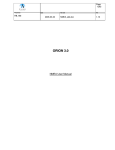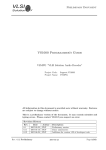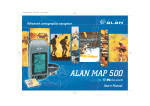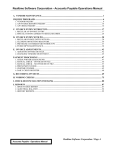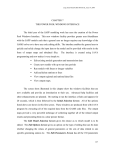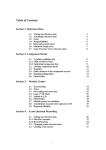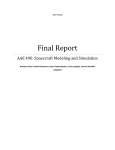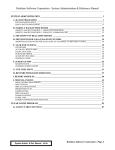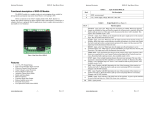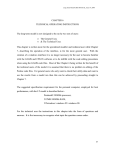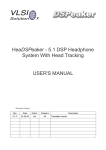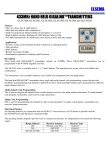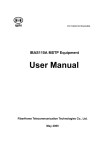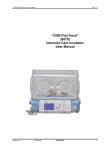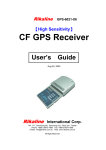Download ORION 3.1
Transcript
Page 1(31) Prepared by: RB, AM Date 2008-03-20 File name Rev NMEA_sdk.doc 1.21 ORION 3.1 NMEA User Manual Page 2(31) Prepared by: Date RB, AM 2008-03-20 File name Rev NMEA_sdk.doc 1.21 CHANGE HISTORY Date Rev Author Status Description of changes 2008-03-25 1.00 AM Draft Initial document version 2008-05-06 1.01 AM Draft Configuration sections are extended. 2008-07-17 1.02 AM Draft Position Pinning Configuration section is updated: zero values for position and velocity thresholds are described. 2008-08-21 1.03 AM Draft Position Pinning Configuration section is updated: more usage examples are added, Configuration Sections sections are updated: comment about error responses is added. 2008-08-21 1.04 AM Draft Position Pinning Configuration section is updated: pinning position update timeout and deep pinning mode delay are added. 2008-08-26 1.05 AM Draft Position Pinning Configuration section is updated: mistakes in examples are fixed 2008-08-27 1.06 AM Draft 1. Added note about usage version string as Orion initialization complete signal. 2. AGPS custom protocol IDs described in Output Configuration section. 2008-09-02 1.07 AM Draft Font size is changed 2008-09-08 1.08 AM Draft ”Reset configurations” is not supported for STOP command. 2008-09-19 1.09 AM Draft UBP mask description is added to the output configuration 2008-09-23 1.10 AM Draft Position Pinning Configuration command update. SLEEP command update. Algorithm Configuration command update. Version Number section update. 2008-10-14 1.11 AM Draft Sleep command description is fixed. 2008-10-21 1.12 AM Draft Algorithm configuration section is removed 2008-11-07 1.13 AM Draft Output Configuration description is updated: new format of UBP mask is described. 2008-11-21 1.14 AM Draft - $PUNV,EPH message description is added - $PUNV,GETCONFIG,11 for current status of SBAS functionality is added 2008-12-03 1.15 MV Draft - FACTORY reset mask updated. 2008-12-05 1.16 AM Draft Typo fix in example in Output Configuration section 2008-12-05 1.17 AM Draft SA and APP subsytems are referenced as SAPP 2008-12-22 1.18 AM Draft Fix of broken link in section 3.3.11 2009-01-23 1.19 AM Draft Project name is updated 2009-02-13 1.20 AM Draft Added clarification on sleep time in Orion 2009-03-02 1.21 AM Draft Version string description is fixed REFERENCES [1] NMEA 0183 Standard For Interfacing Marine Electronic Devices (http://www.nmea.org) [2] u-Map™ Application Note [3] u-Nav Binary Protocol Specification for SDK Users, version 2.0 Page 3(31) Prepared by: Date RB, AM 2008-03-20 File name Rev NMEA_sdk.doc 1.21 [4] ICD-GPS-200, Revision C [5] “Atheros MultiMode 3GPP Subsystem Protocol Specification, v1.50” ABBREVIATIONS Acronym Description AGPS Assisted GPS ASCII American Standard Code for Information Interchange bps Bits Per Second CRC Cyclic Redundancy Check FOM Figure Of Merit FSH Flash memory GMT Greenwich Mean Time GPS Global Positioning System HW Hardware ID Identifier LGF Last Good Fix LSE Least Square Estimation N/A Not Applicable NMEA The National Marine Electronics Association NVRAM Non Volatile RAM ORION Atheros brand of GPS receivers PVT Position-Velocity-Time PRN Pseudo Random Noise. Identifier for SV. RAIM Receiver Autonomous Integrity Monitoring RAM Random Access Memory RF Radio Frequency RTC Real Time Clock SAPP Storable Application Profile Subsystem SAGPS Self-Assisted GPS SBAS Satellite Based Augmentation System SDK Software Development Kit SV Space Vehicle. Another name for satellite. TCXO Temperature Controlled Crystal Oscillator TOW Time Of Week UART Universal Asynchronous Receiver / Transmitter UBP u-Nav Binary Protocol UTC Universal Time Coordinated VSDSP VLSI Solution DSP WGS84 World Geodetic System reference frame for the earth, for use in geodesy and navigation Page 4(31) Prepared by: RB, AM Date 2008-03-20 File name Rev NMEA_sdk.doc 1.21 TABLE OF CONTENTS CHANGE HISTORY ............................................................................................................2 REFERENCES ....................................................................................................................2 ABBREVIATIONS ...............................................................................................................3 TABLE OF CONTENTS ......................................................................................................4 1 OVERVIEW....................................................................................................5 2 FORMAT .......................................................................................................5 2.1 CRC Calculation ............................................................................................5 2.2 Sentence Termination Delimiter .....................................................................5 3 CUSTOM NMEA SENTENCES .....................................................................6 3.1 Timing Limits ..................................................................................................6 3.2 Size Limits......................................................................................................6 3.3 Format Description .........................................................................................7 3.3.1 ASSIST ..........................................................................................................7 3.3.2 CORR ............................................................................................................7 3.3.3 STORELGF....................................................................................................8 3.3.4 START ...........................................................................................................8 3.3.5 SLEEP ...........................................................................................................9 3.3.6 WAKEUP .......................................................................................................10 3.3.7 STOP .............................................................................................................10 3.3.8 CONFIG .........................................................................................................11 3.3.9 SET ................................................................................................................11 3.3.10 GETCONFIG ..................................................................................................11 3.3.11 VERSION .......................................................................................................11 3.3.12 FOM ...............................................................................................................12 3.3.13 EPH 1,2,3 ......................................................................................................12 3.3.14 EPH 0 ............................................................................................................14 3.3.15 CFG_R ...........................................................................................................14 3.3.16 CFG_S ...........................................................................................................15 3.3.17 ERR ...............................................................................................................15 3.3.18 OK .................................................................................................................16 3.4 Configuration Sections ...................................................................................17 3.4.1 Output Configuration ......................................................................................17 3.4.2 Time Zone Configuration ................................................................................19 3.4.3 Version Number .............................................................................................20 3.4.4 SBAS Configuration .......................................................................................20 3.4.5 Datum Configuration ......................................................................................21 3.4.6 Position Pinning Configuration .......................................................................23 4 STANDARD NMEA SENTENCES .................................................................24 5 APPENDIX A - DATUM CODES ....................................................................25 Page 5(31) Prepared by: Date RB, AM 1 2008-03-20 File name Rev NMEA_sdk.doc 1.21 OVERVIEW This document describes the format and usage of the Atheros custom NMEA messages in the Orion navigation software. It also details the implementation specifics of standard NMEA output messages supported by Orion. 2 FORMAT Atheros custom NMEA messages are structured according to the standard template of NMEA format. Every message starts with a dollar-sign ‘$’. After this prefix there will be an Atheros command prefix ‘PUNV’ (not registered) and a comma ‘,’. After the comma, there is the command field which is defined in section 3. The command field ends with an asterisk ‘*’ and a two digit hexadecimal CRC checksum. The line is executed after <carriage return> <new line> character pair. Example line: “$PUNV,<command>*cc<carriage return><new line>” Please note all the NMEA messages, which do not start with dollar sign ‘$’ will be ignored without any error response. 2.1 CRC Calculation The CRC calculation is explained in the NMEA standard [1]. If the CRC is omitted or illegal, the message will be rejected. CRC value ‘cc’ (two lower case c-characters) will always be accepted. 2.2 Sentence Termination Delimiter All sentences end with the sentence termination delimiter <carriage return><new line>. This combination is ‘\r\n’ in C-language format and hexadecimal ASCII values are ‘0Dh0Ah’. Both characters have to be sent after CRC to execute the command. Page 6(31) Prepared by: Date RB, AM 3 2008-03-20 File name Rev NMEA_sdk.doc 1.21 CUSTOM NMEA SENTENCES The command field starts the custom command. Atheros custom NMEA messages are defined below in Table 3-1. Table 3-1 Atheros custom NMEA messages Command / Response In/Out Description ASSIST In UTC time assistance input message CORR In u-Map assistance message STORELGF In Force immediate LGF store operation START In Request for immediate restart SLEEP In Request to stop the navigation and enter to sleep mode WAKEUP In Wake up from sleep STOP In Request to stop the navigation CONFIG In Request to configure configuration section SET In Change configuration in RAM only GETCONFIG In Request to read configure information of configuration section VERSION In Alias to PUNV,GETCONFIG,09 FOM Out Navigation quality indicator (figure-of-merit) CFG_R Out Reply message for read configure information CFG_S Out Reply message for write configure information ERR Out Error message OK Out Success message If the NMEA string can be decoded to explicit command for the Orion system, the same message will be echoed back to sender. 3.1 Timing Limits The current version of Orion will not operate properly if the user sends more than one custom NMEA message in a second. 3.2 Size Limits According to the NMEA standard the maximum number of characters between the starting delimiter ‘$’ or ‘!’ and the terminating <CR><LF> should be 79, i.e. the maximum needed buffer size should be 82 for one sentence. For the custom NMEA messages the maximum size of the input messages is 128 characters and for the output messages 200 characters. Page 7(31) Prepared by: Date RB, AM 2008-03-20 3.3 Format Description 3.3.1 ASSIST File name Rev NMEA_sdk.doc 1.21 With ASSIST command the user can inject time assistance into the navigation software. The format of ASSIST command is the following: $PUNV,ASSIST,hhmmss.ss,ddmmyy*cc hhmmss.ss is the UTC time: (00.00…59.99) ddmmyy hh – hours (00…23), mm – minutes (00…59), ss.ss – seconds is the UTC date: dd – day (01…31), mm – month (01…12), yy – year (00…99) $PUNV,ASSIST,tow,wn*cc is time of the week in milliseconds (0…604699999) and (starting from January 6, 1980) tow 3.3.2 wn is a week number CORR CORR command injects u-Map assistance information into the navigation software. Please find more information about u-Map feature from [2]. The format of CORR command is as follows: $PUNV,CORR,hhmmss.sss,llll.llll,N/S,yyyyy.yyyy,E/W,h.h,c.c*cc hhmmss.sss is timestamp, which must match the NMEA timestamp from the message set that the correction applies to. The format is: hh – hours (00…23), mm – minutes (00…59), ss.sss – seconds (00.000…59.999) is snapped-to latitude. Degrees-minutes are in decimal format – 2 fixed digits of degrees (00…90), 2 fixed digits of minutes (00…59) and 4 fixed digits for decimalfraction of minutes (0000…9999). Leading zeros always included for degrees and minutes to maintain fixed length. Trailing zeros always added for decimal-fraction of minutes to maintain fixed length. llll.llll N/S is latitude hemisphere: North (N) or South (S) is snapped-to longitude. Degrees-minutes are in decimal format – 3 fixed digits of degrees (000…180), 2 fixed digits of minutes (00…59) and 4 fixed digits for decimalfraction of minutes (0000…9999). Leading zeros always included for degrees and minutes to maintain fixed length. Trailing zeros always added for decimal-fraction of minutes to maintain fixed length. yyyyy.yyyy E/W is longitude direction, which indicates the longitude direction: East (E) or West (W). Page 8(31) Prepared by: Date RB, AM 2008-03-20 File name Rev NMEA_sdk.doc 1.21 is heading in degrees (optional). Variable length integer or floating point numeric field. The decimal point and associated decimal fraction are optional. A null field should be used to indicate that no heading assistance is provided. h.h indicates the degree of confidence of the snapped-to position. Variable length integer or floating point numeric field. The decimal point and associated decimal fraction are optional. c.c 3.3.3 STORELGF With STORELGF command the user can force immediate LGF storage $PUNV,STORELGF*23 3.3.4 START With START command the user can restart the navigation and erase different kind of data at the same time. $PUNV,START,bitmask*cc bitmask is a hexadecimal number (without ‘0x’ prefix) specifying the data to be erased Table 3-2 Bitmasks Bitmask Description 0x001 Erase position from NVRAM, FSH and RAM 0x002 Erase accurate time, leave inaccurate time 0x004 Erase RTC time 0x008 Erase TCXO offset and drift values from NVRAM, FSH and RAM 0x010 Erase UTC parameters from FSH and RAM 0x020 Erase ionospheric correction parameters from FSH and RAM 0x040 Erase all almanacs from FSH and RAM 0x080 Erase NVRAM 0x100 Reset configurations from FSH and RAM (Output, Zone, Debug, Datum, VSDSP, pinning) 0x200 Erase all ephemerides from FSH and RAM 0x400 Erase all prehistory information collected so far in FSH and RAM There is a number of predefined mnemonics to be used with the START command. When alias is used the command has the following form: $PUNV,START,alias*cc alias is a mnemonic specifying the particular bitmask Page 9(31) Prepared by: Date RB, AM 2008-03-20 File name Rev NMEA_sdk.doc 1.21 Table 3-3 Aliases Alias Bitmask Description FACTORY 0xFF7F Start-up with no prior information and reset configuration (FSH and RAM) to compiled–in factory defaults ALL 0x02FF Erase everything else except configurations COLD 0x02F7 Retain TCXO and configurations LGFCOLD 0x02F6 Retain TCXO, position and configurations WARM 0x0202 Retain TCXO, position, RTC time and configurations NOTIME 0x0004 Erase time, retain everything else MEDIUM 0x0002 Erase time, but leave RTC HOT 0x0000 Do not erase anything AUTO 0x0000 Do not erase anything START command in its simplest form is also supported: $PUNV,START*71 , which just restarts navigation without erasing anything. So effectively it is equal to $PUNV,START,HOT*0E and $PUNV,START,AUTO*52 and $PUNV,START,0*6D commands 3.3.5 SLEEP With the SLEEP command the user can put the system into the sleep mode. The system stays in the sleep mode until it is forced to wake up by activity on UART0 or after specified timeout. The NMEA command for the sleep mode without timeout is $PUNV,SLEEP,bitmask*cc bitmask is a hexadecimal number (without ‘0x’ prefix) specifying the data to be erased and has the same set of possible values as for START command described in 3.3.4 SLEEP command in its simplest form is also supported: $PUNV,SLEEP*7E , which effectively equals to $PUNV,SLEEP,0*62 Page 10(31) Prepared by: Date RB, AM 2008-03-20 File name Rev NMEA_sdk.doc 1.21 The NMEA command for sleep mode for a predefined time has the following form: $PUNV,SLEEP,hh,mm,ss*cc hh is hours (00…24) mm ss is minutes (00…59) is seconds (00…59). The total sleeping time specified should be less than 90000 seconds. Please note that specified sleep time determines exactly the period of time, when power consumption of single-chip GPS receiver stays low. If measuring sleep time by watching NMEA stream, it might be several seconds longer due to processing overhead in Orion related to messages processing, UART queue flushing delays etc. 3.3.6 WAKEUP To wake up from sleep, send any kind of NMEA message to UART0 port. The content of this message is disregarded by the system. After the wakeup from sleep, the system is always started in auto mode just like if $PUNV,START,AUTO*52 command was sent. For distinctness sake the following command can be used $PUNV,WAKEUP*2C 3.3.7 STOP With STOP command the user can stop the navigation and erase different kind of data at the same time. $PUNV,STOP,bitmask*cc is a hexadecimal number (without ‘0x’ prefix) specifying the data to be erased. It has the same set of possible values as for START command described in 3.3.4. The exception is “Reset Configurations from FSH and RAM”, which should not be used with STOP command. bitmask There is a number of predefined mnemonics to be used with the STOP command. When alias is used the command has the following form: $PUNV,STOP,alias*cc alias is a mnemonic specifying the particular bitmask. It has the same set of possible values as for START command described in 3.3.4. The only exceptions are FACTORY, HOT and AUTO aliases, which are not supported for STOP command. STOP command in its simplest form is also supported: $PUNV,STOP*29 Page 11(31) Prepared by: Date RB, AM 2008-03-20 File name Rev NMEA_sdk.doc 1.21 , which just stops navigation without erasing anything. So effectively it is equal to $PUNV,STOP,0*35 Please note that the confirmation for STOP command will be echoed only after the system has stopped. Until that Orion will produce navigation data. 3.3.8 CONFIG With CONFIG command the user can change the configuration of the system. The configuration takes effect immediately and it is also stored in non-volatile media. The format of CONFIG command is the following: $PUNV,CONFIG,section ID,Various number of comma separated fields*cc is a decimal number specifying the section ID. It is 2 fixed decimal digits and leading zeros are mandatory. section ID Reply to this command is CFG_S sentence described in 3.3.16 3.3.9 SET With SET command the user can change the configuration of the system. The configuration takes effect immediately, but the new configuration is not stored in nonvolatile media. The format of SET command is the following: $PUNV,SET,section ID,Various number of comma separated fields*cc section ID is a decimal number specifying the section ID. It is two fixed decimal digits and leading zeros are mandatory. 3.3.10 GETCONFIG By GETCONFIG command the user can read the configuration of the system. The format of this message is as follows: $PUNV,GETCONFIG,section ID*cc section ID is a decimal number specifying the section ID. It is two fixed decimal digits and leading zeros are mandatory. Reply to this command is CFG_R sentence described in 3.3.13 3.3.11 VERSION By VERSION command the user can read version number string. The format of this message is as follows: $PUNV,VERSION*6B Page 12(31) Prepared by: Date RB, AM 2008-03-20 File name Rev NMEA_sdk.doc 1.21 The reply to this command is CFG_R sentence described in 3.4.3 This command is an alias to the command $PUNV,GETCONFIG,09*48 3.3.12 FOM This message is navigation (PVT) quality indicator, i.e. figure-of-merit. It has the following format: $PUNV,FOM,fom*cc fom a floating point number (.000….999). Please see section 3.4.1 describing the way how this message can be enabled. 3.3.13 EPH 1,2,3 It is an ephemeris message, which contains the ephemeris data for one PRN and the internal status (validity) of ephemeris and almanac for all PRN’s. Please refer to [4] for ephemeris data detailed description. The EPH message is used by the SAGPS function to collect live ephemeris data for use in its prediction algorithm. Three EPH messages are required to send the data for one PRN. The format of the messages is as follows: $PUNV,EPH,1,SS,EphMask,AlmMask,SF1_3,SF1_7,SF1_8,SF1_9,SF1_10*cc $PUNV,EPH,2,SS,SF2_3,SF2_4,SF2_5,SF2_6,SF2_7,SF2_8,SF2_9,SF2_10*cc $PUNV,EPH,3,SS,SF3_3,SF3_4,SF3_5,SF3_6,SF3_7,SF3_8,SF3_9,SF3_10*cc SS is the PRN number (1…32) indicates if Orion has valid ephemeris for particular PRN. EphMask of 0A050301 means that Orion has valid ephemeris for PRN's 28, 26, 19, 17, 10, 9, and 1. EphMask NOTE: Any ephemeris from a predicted process (SAGPS or whatever) will have its associated mask value cleared. For example, in the $PUNV,EPH,1,01,0A050300,… the one can see that this data is for PRN 1, however the mask value for PRN 1 is 0. Therefore this should not be used by the prediction process. AlmMask indicates if Orion has valid almanac for particular PRN. means we have valid almanac for all satellites except PRN 1. AlmMask of FFFFFFFE Each sub-frame word in the message format is designated as SFx_y, where x - subframe number (1, 2, or 3) and y - word number in sub-frame (1-10). SF1_3[23:14] SF1_3[7:2] - – Week No.: ephemeris reference week number [9:0] SV health: transmitting satellite health [5:0] Page 13(31) Prepared by: Date RB, AM 2008-03-20 File name Rev NMEA_sdk.doc 1.21 SF1_3[1:0] – IODC: Issue Of Data, Clock [9:8] SF1_7[7:0] – TGD: Estimated Group Delay Differential (sec) [7:0] SF1_8[23:16] SF1_8[15:0] – toc: Clock Data Reference Time (16 sec) [15:0] SF1_9[23:16] SF1_9[15:0] – IODC: Issue Of Data, Clock [7:0] - af2: SV Clock Correction (sec/sec2) [7:0] - af1: SV Clock Correction: (sec/sec) [15:0] SF1_10[23:2] - af0: SV Clock Correction: (sec) [21:0] SF2_3[23:16] – IODE: Issue Of Data, Ephemeris [7:0] – Crs: Amplitude of the Sine Harmonic Correction Term to the Orbit Radius (meters) [15:0] SF2_3 [15:0] SF2_4[23:8] SF2_4[7:0] – ∆n: Mean Motion Difference From Computed Value (semi-circles/sec) [15:0] – M0: Mean Anomaly at Reference Time (semi-circles) [31:24] SF2_5[23:0] - M0: Mean Anomaly at Reference Time (semi-circles) [23:0] SF2_6[23:8] – Cuc: Amplitude of the Cosine Harmonic Correction Term to the Argument of Latitude (radians) [15:0] SF2_6[7:0] – e: Eccentricity [31:24] SF2_7[23:0] – e: Eccentricity [23:0] – Cus: Amplitude of the Sine Harmonic Correction Term to the Argument of Latitude (radians) [15:0] SF2_8[23:8] SF2_8[7:0] – (A)1/2: Square Root of the Semi-Major Axis (m½) [31:24] SF2_9[23:0] – (A)1/2: Square Root of the Semi-Major Axis (m½) [23:0] SF2_10[23:8] SF2_10[7] – toe: Reference Time Ephemeris (16 sec) [15:0] – Fit: Curve fit interval flag [0] SF3_3[23:8] – Cic: Amplitude of the Cosine Harmonic Correction Term to the Angle of Inclination (radians) [15:0] – (OMEGA)0: Longitude of Ascending Node of Orbit Plane at Weekly Epoch (semi-circles) [31:24] SF3_3[7:0] SF3_4[23:0] - (OMEGA)0: Longitude of Ascending Node of Orbit Plane at Weekly Epoch (semi-circles) [23:0] Page 14(31) Prepared by: Date RB, AM 2008-03-20 File name Rev NMEA_sdk.doc 1.21 - Cis: Amplitude of the Sine Harmonic Correction Term to the Angle of Inclination (radians) [15:0] SF3_5[23:8] SF3_5[7:0] - i0: Inclination Angle at Reference Time (semi-circles) [31:24] SF3_6[23:0] – i0: Inclination Angle at Reference Time (semi-circles) [23:0] - Crc: Amplitude of the Cosine Harmonic Correction Term to the Orbit Radius (meters) [15:0] SF3_7[23:8] SF3_7[7:0] – ω: Argument of Perigee (semi-circles) [31:24] SF3_8[23:0] – ω: Argument of Perigee (semi-circles) [23:0] SF3_9[23:0] – OMEGADOT: Rate of Right Ascension (semi-circles/sec) [23:0] SF3_10[23:16] SF3_10[15:2] – IODE: Issue Of Data, Ephemeris [7:0] – IDOT: Rate of Inclination Angle (semi-circles/sec) [13:0] The ephemeris data in EPH messages is formatted as sub-frame words in hexadecimal encoding with LSB on the right side. Fixed length (6 hexadecimal digits) is used for SFx_y fields (SF1_3, SF1_7 … are just placeholders for the sub-frame words), because each 30 bit sub-frame word from the satellite contains only 24 bits of data (6 parity bits). Since the sub-frame words are generated from decoded and verified ephemeris data no parity information is included. Therefore each word contains 24 bits of sub-frame data. Example: SF1_9 field: contains af2 (8 bits) and af1 (16 bits terms). If af2 = 0x11 and af1 = 0x5555, then the SF1_9 field would be 115555. Note that no data is transmitted for SFx_1 or SFx_2 (TOW and Handover words) or for SF1_4, SF1_5 or SF1_6 (unusable reserve data + L2P flag (also not used)). 3.3.14 EPH 0 To facilitate detection of the need for ephemeris the EPH message with only the mask values will come out when the ephemeris mask is 0. When the EphMask is non-zero the normal 3 message set will come out. The AlmMask may or may not be zero. $PUNV,EPH,0,EphMask,AlmMask*cc Please see section 3.3.13 for description of EphMask and AlmMask fields in this message. This message is generated when no ephemeris is valid. 3.3.15 CFG_R Page 15(31) Prepared by: Date RB, AM 2008-03-20 File name Rev NMEA_sdk.doc 1.21 CFG_R sentence is a reply message for request of reading configuration. This NMEA message contains all configuration information about the selected section. $PUNV,CFG_R,section ID,Comma separated list of parameters in selected section*cc section ID is a decimal number specifying the section ID. It is two fixed decimal digits with leading zeros if necessary. 3.3.16 CFG_S CFG_S sentence is a reply message for request of changing configuration by $PUNV,CONFIG command. The format of the message is as follows. $PUNV,CFG_S,section ID*cc section ID is a decimal number specifying the modified section ID. It is two fixed decimal digits with leading zeros if necessary. This reply message is sent when configuration data is already successfully stored into non-volatile memory (flash). 3.3.17 ERR ERR is a reply message of an error in the system. The format of the message is as follows: $PUNV,ERR,ID,error,data*cc is the ID of subsystem, which detected the error. Two decimal digits with leading zero if necessary. ID is the subsystem specific error number. Five decimal digits with leading zero if necessary. error data is the error specific optional data. Five decimal digits with leading zero if necessary. This document describes only those error codes that occur with NMEA commands. Table 3-4. Error codes ID Subsystem error data Description 4 AGPS message ID sub-code* AGPS message processing error. Message ID in the error code field specifies which message processing is failed. Please see [5] for detailed description of supported AGPS messages. 5 NMEA 1 0 Illegal command form 5 NMEA 2 0 Illegal command prefix 5 NMEA 3 0 Illegal command 5 NMEA 4 0 Illegal section ID 5 NMEA 5 0 Illegal parameter Page 16(31) Prepared by: Date RB, AM 2008-03-20 File name Rev NMEA_sdk.doc 1.21 ID Subsystem error data Description 5 NMEA 6 0 Illegal CRC 5 NMEA 7 0 Illegal message 7 SAPP 1 sub-code* Reading file data: file open operation is failed 7 SAPP 2 sub-code* Reading file data: file seek operation is failed 7 SAPP 3 sub-code* Reading file data: file read operation is failed 7 SAPP 4 sub-code* Reading file data: file close operation is failed 7 SAPP 5 sub-code* Reading file data: get file size operation is failed 7 SAPP 6 sub-code* Writing data to file: file open operation is failed 7 SAPP 7 sub-code* Filling data into file: file seek operation is failed 7 SAPP 8 sub-code* Filling data into file: file write operation is failed 7 SAPP 9 sub-code* Writing data to file: file seek operation is failed 7 SAPP 10 sub-code* Writing data to file: file write operation is failed 7 SAPP 11 sub-code* Writing data to file: file close operation is failed 7 SAPP 12 sub-code* Memory allocation failed 7 SAPP 13 sub-code* Incoming request is rejected 7 SAPP 14 sub-code* Error detected in the incoming request. Possible reason is the store request for incorrect data. 7 SAPP 15 sub-code* Erase file operation failed 7 SAPP 16 sub-code* Illegal configuration data is detected in the flash. Possible reason is incorrect start-up values set by SDK user. * sub-code is used for detailed description of error. It is implementation specific code. Examples of error messages: Illegal CRC: $PUNV,ERR,05,00006,00000*5B Illegal command: $PUNV,ERR,05,00003,00000*5E 3.3.18 OK OK is an acknowledgement message, which is sent as reply of successful execution of command, sent via different protocol. Currently OK is sent to confirm successful execution of commands sent via AGPS protocol. The format of the message is as follows: $PUNV,OK,ID,message ID*cc is the ID of responding navigation subsystem. Two decimal digits with leading zero if necessary. ID message ID is the ID of successfully executed command. Five decimal digits with leading zeros if necessary. Page 17(31) Prepared by: Date RB, AM 2008-03-20 3.4 Configuration Sections 3.4.1 Output Configuration File name Rev NMEA_sdk.doc 1.21 Output configuration is used to configure input/output protocol. The current output configuration can be read in the system with the following command: $PUNV,GETCONFIG,00*41 The answer is as follows: $PUNV,CFG_R,00,CM-OutCM-In,0,1000,UART,NMEA_MASK*cc The configuration command template for output configuration is as follows: $PUNV,CONFIG,00,CM-OutCM-In,0,1000,UART,NMEA_MASK/UBP_MASK*cc or $PUNV,SET,00,CM-OutCM-In,0,1000,UART,NMEA_MASK/UBP_MASK*cc Table 3-5 Output configuration Name Format Valid values Default value Description CM-In Two hexadecimal digits 00 – NMEA 00 - NMEA Input communication protocol 00- NMEA Output communication protocol 4800 UART communication speed (bps) 01 – UBP 04 – AGPS 3GPP 05 – AGPS 3GPP2 09 – AGPS custom 10 – User specific CM-Out Two hexadecimal digits 00 – NMEA 01 – UBP 04 – AGPS 3GPP 05 – AGPS 3GPP2 09 – AGPS custom 10 – User specific UART Decimal 300,1200,2400,4800, 9600,14400,19200, 28800,57600,115200 Page 18(31) Prepared by: Date RB, AM 2008-03-20 File name Rev NMEA_sdk.doc 1.21 Name Format Valid values Default value Description NMEA_MASK Three hexadecimal digits 001 – GGA 01D 002 – GLL NMEA mask. It is a hexadecimal number that enables selected output NMEA messages. Different combinations of the outputting messages can be selected by calculating the final hexadecimal number after adding all wanted hexadecimal masks together. FOM message is described in section 3.3.12 and EPH message is described in sections 3.3.13 and 3.3.14. N/A Comma separated list of hexadecimal UBP message IDs, which are sent out by UART. The maximum number of IDs in the list is limited by the maximum size of custom NMEA sentence, which is 128 characters. A special encoding is used to represent UBP messages in the list: Each entry encoded by up to eight hexadecimal digits. The least significant word is a base UBP message ID. The most significant word is a bit mask representing up to 16 UBP messages: bit 16 represents UBP message with ID = (base UBP message ID + 1), bit 17 represents UBP message with ID = (base UBP message ID + 2) and so on. Therefore one 32 bit word can encode up to 17 UBP message IDs. For example, UBP list entry 0x80010201 encodes UBP messages 0x201, 0x202 and 0x211. 004 – GSA 008 – GSV 010 – RMC 020 – VTG 040 – ZDA 080 – DTM 100 – FOM 200 – EPH UBP_MASK List of eight hexadecimal digits separated by commas Please see [3] for possible UBP messages’ ID codes Note! If the user changes the input communication protocol to other than NMEA, then to return to NMEA as an input protocol the new protocol specific command should be used. Please note that there is no comma or space between CM-Out and CM-In fields. The application profile subsystem will check the maximum length of the NMEA messages when changing output section. For example, if the speed is set to 4800 bps, the output protocol is NMEA and the selected NMEA messages will take bandwidth more than 450 characters per second, the application profile subsystem will produce an error message and reject the changes. In case of successful execution of $PUNV,CONFIG,00,CM-OutCM-In,0,1000,UART,NMEA_MASK/UBP_MASK*cc command the receiver sends confirmation in a following form: Page 19(31) Prepared by: Date RB, AM 2008-03-20 File name Rev NMEA_sdk.doc 1.21 $PUNV,CFG_S,00*53 In case of failure of execution of GETCONFIG, CONFIG or SET command the receiver sends ERR reply message. Please see ERR section for details. Examples: To produce all other messages but EPH, DTM and FOM at the speed of 115200 bps: $PUNV,CONFIG,00,0000,0,1000,115200,7F*cc To disable the default NMEA messages: $PUNV,CONFIG,00,0000,0,1000,4800,0*cc 3.4.2 Time Zone Configuration Time Zone configuration is used to configure user localization data. The current configuration can be read in the system by the following command: $PUNV,GETCONFIG,03*42 The answer is as follows: $PUNV,CFG_R,03,HZ,MZ*cc The configuration command template for the Time Zone configuration is $PUNV,CONFIG,03,HZ,MZ*cc or $PUNV,SET,03,HZ,MZ*cc Table 3-6 Time zone configuration Name Format Valid values Default value Description HZ Decimal -11,-10,-9,...,12 999 (not set) 999 Hour zone. It is an amount of full hour difference from the GMT. MZ Decimal 0,15,30,45 999 (not set) 999 Minute zone. It is an amount of extra minutes over the full hours. In case of successful execution of $PUNV,CONFIG,03,HZ,MZ*cc command the receiver sends confirmation in a following form: $PUNV,CFG_S,03*50 Page 20(31) Prepared by: Date RB, AM 2008-03-20 File name Rev NMEA_sdk.doc 1.21 In case of failure of execution of GETCONFIG, CONFIG or SET command the receiver sends ERR reply message. Please see ERR section for details. Examples: To set the -8 hour time zone: $PUNV,CONFIG,03,-8,0*31 3.4.3 Version Number Version configuration is used to deliver system version numbers. If output protocol is NMEA, then version numbers message is also reported after power-on, any commanded start command described in 3.3.4 section and after exiting sleep mode. In this case version numbers message is used for notification that Orion’s initialization sequence is complete and it is ready to accept commands. The version numbers can be read by using the following command: $PUNV,GETCONFIG,09*48 The answer is as follows: $PUNV,CFG_R,09,Orion,UBP,BB,Flash,DeviceID,RF-mode,RF-CS,TCXO-PPB,TCXO-Freq*cc is the Orion version string Orion UBP BB is the UBP version number is the baseband type Flash is the flash type DeviceID is RF-mode RF-CS the device identifier (hexadecimal number) is RF chip mode (these changed by the a SDK user) is RF IC chip select (these can be changed by a SDK user) TCXO-PPB is the TCXO uncertainty (this can be changed by a SDK user) TCXO-Freq is the TCXO frequency (this can be changed by a SDK user) In case of failure of execution of this command the receiver sends ERR reply message. Please see ERR section for details. 3.4.4 SBAS Configuration SBAS configuration is used to configure SBAS functionality. The current SBAS configuration can be read in the system with the following command: Page 21(31) Prepared by: Date RB, AM 2008-03-20 File name Rev NMEA_sdk.doc 1.21 $PUNV,GETCONFIG,11*41 The answer is as follows: $PUNV,CFG_R,11,Sbas,X,X,X,X,X,X,X,X,X,X,X,X,X,X,X,X,X*cc Table 3-7 SBAS configuration Name Format Valid values Default value Description Sbas Decimal number 0,1 1 SBAS master control: 0 - SBAS is switched off, 1 - SBAS is switched on. X N/A N/A N/A N/A SBAS functionality can be switched on or off by following command $PUNV,CONFIG,SBAS,Status*cc or $PUNV,SET,SBAS,Status*cc Table 3-8 SBAS configuration Name Format Valid values Default value Description Status String ON, OFF ON SBAS status: ON – SBAS is switched on, OFF- SBAS is switched off. In case of successful execution of $PUNV,CONFIG,SBAS,Status*cc command, the receiver sends confirmation in a following form: $PUNV,CFG_S,11*53 In case of failure of execution of GETCONFIG, CONFIG or SET command the receiver sends ERR reply message. Please see ERR section for details. 3.4.5 Datum Configuration Datum configuration is used to select the output datum. The current configuration can be read in the system by the following command: $PUNV,GETCONFIG,13*43 The answer is as follows: $PUNV,CFG_R,13,Dx,Dy,Dz,Da,Df,Name,Id*cc Page 22(31) Prepared by: Date RB, AM 2008-03-20 File name Rev NMEA_sdk.doc 1.21 The configuration command template for custom datum is as follows: $PUNV,CONFIG,13,Dx,Dy,Dz,Da,Df,Name*cc or $PUNV,SET,13,Dx,Dy,Dz,Da,Df,Name*cc To select one of the predefined data, the syntax is as follows: $PUNV,CONFIG,16,Id*cc or $PUNV,SET,16,Id*cc Table 3-9 Datum configuration Name Format Valid values 15 15 Default value Description Dx Decimal -2 -1…2 -1 0 Datum centre X shift in respect to WGS84 ellipsoid (in meters). Dy Decimal -215-1…215-1 0 Datum centre Y shift in respect to WGS84 ellipsoid (in meters). Dz Decimal -2 -1…2 -1 0 Datum centre Z shift in respect to WGS84 ellipsoid (in meters). Da Decimal with fractional part >0 6378137 Datum semi-major axis (in meters). Df Fractional decimal 0…1 0.003352810664 Flattening of datum. Name String up to 8 characters long Please see Appendix A Datum codes for possible datum names. WGS84 The name of the selected datum. Id Decimal Please see Appendix A Datum codes for possible ID numbers. 1 Identifier of a pre-defined datum. 15 15 In case of successful execution of $PUNV,CONFIG,13,Dx,Dy,Dz,Da,Df,Name*cc and $PUNV,CONFIG,16,Id*cc commands the receiver sends confirmation in a following form: $PUNV,CFG_S,13*51 In case of failure of execution of GETCONFIG, CONFIG or SET command the receiver sends ERR reply message. Please see ERR section for details. Page 23(31) Prepared by: Date RB, AM 2008-03-20 File name Rev NMEA_sdk.doc 1.21 Examples: Default settings: $PUNV,CONFIG,16,1*0D 3.4.6 Position Pinning Configuration Position pinning configuration is for static case parameter configuration. The current configuration can be read in the system by the following command: $PUNV,GETCONFIG,17*47 The answer is as follows: $PUNV,CFG_R,17,Position threshold,Velocity reacquisition 2D all 2D cold *cc threshold,Position update timeout,Deep mode delay,2D The configuration command template for control configuration is as follows: $PUNV,CONFIG,17,Position threshold,Velocity threshold, Position update timeout,Deep mode delay,2D reacquisition 2D all 2D cold*cc or $PUNV,SET,17,Position threshold,Velocity threshold,2D reacquisition 2D all 2D cold*cc Table 3-10 Position pinning parameters Name Format Valid values Default value Description Position threshold Decimal with fractional part ≥0 50 The threshold value for position jump. Position pinning will be disabled if this value is reached (in meters). Zero values for position and velocity thresholds effectively mean that position pinning is disabled. Velocity threshold Decimal with fractional part ≥0 1 The threshold value for velocity calculation. Position pinning will be disabled if this value is reached (in meters per second). Zero values for position and velocity thresholds effectively mean that position pinning is disabled. Position update timeout Decimal >0 120 In position pinning mode, pinned position is updated based on this timeout (in seconds). Deep mode delay Decimal ≥0 600 When in position pinning mode, deep pinning mode is activated after this delay (in seconds). If 0, then deep pinning mode is disabled. 2D reacquisition Hexadecimal 0,1 0 Indicates if 2D start-up mode is enabled in reacquisition: 0 – disabled, 1 – enabled. Please see usage examples below. Page 24(31) Prepared by: Date RB, AM 2008-03-20 File name Rev NMEA_sdk.doc 1.21 Name Format Valid values Default value Description 2D all Hexadecimal 0,1 0 Indicates if 2D start-up mode is enabled in all start modes except COLD start: 0 – disabled, 1 – enabled. Please see usage examples below. 2D cold Hexadecimal 0,1 0 Indicates if 2D start-up mode is enabled in COLD start: 0 – disabled, 1 – enabled. Please see usage examples below. In case of successful execution of $PUNV,CONFIG,17,Position threshold,Velocity threshold, Position update timeout,Deep mode delay,2D reacquisition 2D all 2D cold*cc command the receiver sends confirmation in a following form: $PUNV,CFG_S,17*55 In case of failure of execution of GETCONFIG, CONFIG or SET command the receiver sends ERR reply message. Please see ERR section for details. Examples: Default settings: $PUNV,CONFIG,17,50,1,120,600,0*cc Default settings plus enabling 2D start-up mode for reacquisition only: $PUNV,CONFIG,17,50,1,120,600,4*cc Default settings plus enabling 2D start-up mode for all start modes only, except COLD start: $PUNV,CONFIG,17,50,1,120,600,2*cc Default settings plus enabling 2D start-up mode for cold start mode only: $PUNV,CONFIG,17,50,1,120,600,1*cc Default settings plus enabling 2D start-up mode for all cases: $PUNV,CONFIG,17,50,1,120,600,7*cc 4 STANDARD NMEA SENTENCES Page 25(31) Prepared by: Date RB, AM 2008-03-20 File name Rev NMEA_sdk.doc 1.21 Orion supports the following standard NMEA messages: DTM, GGA, GLL, GSA, GSV, RMC, VTG and ZDA. The following format conventions have been used, in accordance with the NMEA standard: 5 - When a null field is used to indicate unavailability of data, also the field for the unit of measure is formatted as a null field - Three digits are always used for decimal-fraction of seconds in UTC time - Four digits are always used for decimal-fraction of minutes in latitude and longitude - DTM: Six digits are always used for decimal-fraction of latitude and longitude offsets. Two digits are always used for decimal-fraction of altitude offset. - GGA: UTC field starts from zero time and changes to measured time when measurement is available (a debugging feature). The number of satellites is always reported with two digits with leading zero when necessary. - GLL: UTC time field as in GGA - GSA: satellite ID numbers are in range 0-99. They are always reported with two digits with leading zero when necessary - GSV: no implementation-specifics - RMC: UTC time field as in GGA, course and speed over ground as in VTG - VTG: course over ground is reported with 0.1 degree precision, speed over ground is reported with 0.1 unit precision for both knots and km/h fields. In case of speed equals zero, the heading is reported as null. - ZDA: Local zone hours are always presented as the user has configured them. The default configuration is 0. The hour zone is reported always by two digits (with leading zero when necessary), and with leading minus sign when necessary. Local zone minutes are always presented with two digits (with leading zero when necessary). UTC time field as in GGA. APPENDIX A - DATUM CODES ID NMBR NAME Region of use 0 "000" User defined 1 "WGS84" Global 2 "ADI-M" Ethiopia; Sudan Page 26(31) Prepared by: Date RB, AM 2008-03-20 File name Rev NMEA_sdk.doc 1.21 ID NMBR NAME Region of use 3 "ADI-E" Burkina Faso 4 "ADI-F" Cameroon 5 "ADI-A" Ethiopia 6 "ADI-C" Mali 7 "ADI-D" Senegal 8 "ADI-B" Sudan 9 "AFG" Somalia 10 "AIN-A" Bahrain 11 "AIN-B" Saudi Arabia 12 "AMA" American Samoa Islands 13 "ANO" Cocos Islands 14 "AIA" Antigua (Leeward Islands) 15 "ARF-A" Botswana 16 "ARF-H" Burundi 17 "ARF-B" Lesotho 18 "ARF-C" Malawi 19 "ARF-M" MEAN FOR Botswana; Lesotho; Malawi; Swaziland; Zaire; Zambia; Zimbabwe 20 "ARF-D" Swaziland 21 "ARF-E" Zaire 22 "ARF-F" Zambia 23 "ARF-G" Zimbabwe 24 "ARS-M" MEAN FOR Kenya; Tanzania 25 ARS-A Kenya 26 "ARS-B" Tanzania 27 "ASC" Ascension Island 28 "ATF" Iwo Jima 29 "SHB" St Helena Island 30 "TRN" Tern Island 31 "ASQ" Marcus Island 32 "AUA" Australia; Tasmania 33 "AUG" Australia; Tasmania 34 "PHA" Djibouti 35 "IBE" Efate & Erromango Islands 36 "BER" Bermuda 37 "BID" Guinea-Bissau 38 "BOO" Colombia 39 "BUR" Indonesia (Bangka & Belitung Ids) 40 "CAZ" Antarctica (McMurdo Camp Area) 41 "CAI" Argentina 42 "CAO" Phoenix Islands Page 27(31) Prepared by: Date RB, AM 2008-03-20 File name Rev NMEA_sdk.doc 1.21 ID NMBR NAME Region of use 43 "CAP" South Africa 44 "CAC" Bahamas; Florida 45 "CGE" Tunisia 46 "CHI" New Zealand (Chatham Island) 47 "CHU" Paraguay 48 "COA" Brazil 49 "DAL" Guinea 50 "DID" Deception Island; Antarctica 51 "BAT" Indonesia (Sumatra) 52 "GIZ" New Georgia Islands (Gizo Island) 53 "EAS" Easter Island 54 "EST" Estonia 55 "EUR-E" Cyprus 56 "EUR-F" Egypt 57 "EUR-G" England; Channel Islands; Scotland; Shetland Islands 58 "EUR-K" England; Ireland; Scotland; Shetland Islands 59 "EUR-C" Finland; Norway 60 "EUR-B" Greece 61 "EUR-H" Iran 62 "EUR-I" Italy (Sardinia) 63 "EUR-J" Italy (Sicily) 64 "EUR-L" Malta 65 "EUR-M" MEAN FOR Austria; Belgium; Denmark; Finland; France; W Germany; Gibraltar; Greece; Italy; Luxembourg; Netherlands; Norway; Portugal; Spain; Sweden; Switzerland 66 "EUR-A" MEAN FOR Austria; Denmark; France; W Germany; Netherlands; Switzerland 67 "EUR-S" MEAN FOR Iraq; Israel; Jordan; Lebanon; Kuwait; Saudi Arabia; Syria 68 "EUR-D" Portugal; Spain 69 "EUR-T" Tunisia 70 "EUS" MEAN FOR Austria; Finland; Netherlands; Norway; Spain; Sweden; Switzerland 71 "FOT" Nevis; St. Kitts (Leeward Islands) 72 "GAA" Republic of Maldives 73 "GEO" New Zealand 74 "GRA" Azores (Faial; Graciosa; Pico; Sao Jorge; Terceira) 75 "GUA" Guam 76 "GSE" Indonesia (Kalimantan) Page 28(31) Prepared by: Date RB, AM 2008-03-20 File name Rev NMEA_sdk.doc 1.21 ID NMBR NAME Region of use 77 "DOB" Guadalcanal Island 78 "HEN" Afghanistan 79 "HER" Croatia -Serbia, Bosnia-Herzegovina 80 "HJO" Iceland 81 "HKD" Hong Kong 82 "HTN" Taiwan 83 "IND-B" Bangladesh 84 "IND-I" India; Nepal 85 "IND-P" Pakistan 86 "INF-A" Thailand 87 "ING-B" Vietnam (Con Son Island) 88 "ING-A" Vietnam (Near 16øN) 89 "INH-A1" Thailand 90 "IDN" Indonesia 91 "IRL" Ireland 92 "ISG" South Georgia Islands 93 "IST" Diego Garcia 94 "JOH" Johnston Island 95 "KAN" Sri Lanka 96 "KEG" Kerguelen Island 97 "KEA" West Malaysia & Singapore 98 "KUS" Caroline Islands 99 "KGS" South Korea 100 "LCF" Cayman Brac Island 101 "LEH" Ghana 102 "LIB" Liberia 103 "LUZ-A" Philippines (Excluding Mindanao) 104 "LUZ-B" Philippines (Mindanao) 105 "MPO" Gabon 106 "MIK" Mahe Island 107 "MAS" Ethiopia (Eritrea) 108 "MER" Morocco 109 "MID" Midway Islands 110 "MIN-A" Cameroon 111 "MIN-B" Nigeria 112 "ASM" Montserrat (Leeward Islands) 113 "NAH-A" Oman (Masirah Island) 114 "NAH-C" Saudi Arabia 115 "NAH-B" United Arab Emirates 116 "NAP" Trinidad & Tobago 117 "NAS-D" Alaska (Excluding Aleutian Ids) Page 29(31) Prepared by: Date RB, AM 2008-03-20 File name Rev NMEA_sdk.doc 1.21 ID NMBR NAME Region of use 118 "NAS-V" Alaska (Aleutian Ids East of 180øW) 119 "NAS-W" Alaska (Aleutian Ids West of 180øW) 120 "NAS-Q" Bahamas (Except San Salvador Id) 121 "NAS-R" Bahamas (San Salvador Island) 122 "NAS-F" Canada (Alberta; British Columbia) 123 "NAS-H" Canada (Manitoba; Ontario) 124 "NAS-G" Canada (New Brunswick; Newfoundland; Nova Scotia; Quebec) 125 "NAS-I" Canada (Northwest Territories; Saskatchewan) 126 "NAS-J" Canada (Yukon) 127 "NAS-O" Canal Zone 128 "NAS-T" Cuba 129 "NAS-U" Greenland (Hayes Peninsula) 130 "NAS-P" MEAN FOR Antigua; Barbados; Barbuda; Caicos Islands; Cuba; Dominican Republic; Grand Cayman; Jamaica; Turks Islands 131 "NAS-N" MEAN FOR Belize; Costa Rica; El Salvador; Guatemala; Honduras; Nicaragua 132 "NAS-E" MEAN FOR Canada 133 "NAS-C" MEAN FOR CONUS 134 "NAS-A" MEAN FOR CONUS (East of Mississippi; River Including Louisiana; Missouri; Minnesota) 135 "NAS-B" MEAN FOR CONUS (West of Mississippi; River Excluding Louisiana; Minnesota; Missouri) 136 "NAS-L" Mexico 137 "NAR-A" Alaska (Excluding Aleutian Ids) 138 "NAR-E" Aleutian Ids 139 "NAR-B" Canada 140 "NAR-C" CONUS 141 "NAR-H" Hawaii 142 "NAR-D" Mexico; Central America 143 "NSD" Algeria 144 "FLO" Azores (Corvo & Flores Islands) 145 "OEG" Egypt 146 "OHA-A" Hawaii 147 "OHA-B" Kauai 148 "OHA-C" Maui 149 "OHA-M" MEAN FOR Hawaii; Kauai; Maui; Oahu 150 "OHA-D" Oahu 151 "FAH" Oman 152 "OGB-A" England 153 "OGB-B" England; Isle of Man; Wales Page 30(31) Prepared by: Date RB, AM 2008-03-20 File name Rev NMEA_sdk.doc 1.21 ID NMBR NAME Region of use 154 "OGB-M" MEAN FOR England; Isle of Man; Scotland; Shetland Islands; Wales 155 "OGB-C" Scotland; Shetland Islands 156 "OGB-D" Wales 157 "PLN" Canary Islands 158 "PIT" Pitcairn Island 159 "PTB" MEAN FOR Burkina Faso & Niger 160 "PTN" Congo 161 "POS" Porto Santo; Madeira Islands 162 "PRP-A" Bolivia 163 "PRP-B" Chile (Northern; Near 19øS) 164 "PRP-C" Chile (Southern; Near 43øS) 165 "PRP-D" Colombia 166 "PRP-E" Ecuador 167 "PRP-F" Guyana 168 "PRP-M" MEAN FOR Bolivia; Chile; Colombia; Ecuador; Guyana; Peru; Venezuela 169 "PRP-G" Peru 170 "PRP-H" Venezuela 171 "HIT" Chile (Near 53øS) (Hito XVIII) 172 "PUR" Puerto Rico; Virgin Islands 173 "PUK" Russia 174 "QAT" Qatar 175 "QUO" Greenland (South) 176 "REU" Mascarene Islands 177 "EUR-I" Italy (Sardinia) 178 "SPK-A" Hungary 179 "SPK-B" Poland 180 "SPK-C" Czechoslovakia 181 "SPK-D" Latvia 182 "SPK-E" Kazakhstan 183 "SPK-F" Albania 184 "SPK-G" Romania 185 "CCD" Czechoslovakia (Prior 1 JAN 1993) 186 "SAE" Espirito Santo Island 187 "SAO" Azores (Sao Miguel; Santa Maria Ids) 188 "SAP" East Falkland Island 189 "SCK" Namibia 190 "SGM" Salvage Islands 191 "SRL" Sierra Leone 192 "SAN-A" Argentina 193 "SAN-B" Bolivia Page 31(31) Prepared by: Date RB, AM 2008-03-20 File name Rev NMEA_sdk.doc 1.21 ID NMBR NAME Region of use 194 "SAN-C" Brazil 195 "SAN-D" Chile 196 "SAN-E" Colombia 197 "SAN-F" Ecuador 198 "SAN-J" Ecuador (Baltra; Galapagos) 199 "SAN-G" Guyana 200 "SAN-M" MEAN FOR Argentina; Bolivia; Brazil; Chile; Colombia; Ecuador; Guyana; Paraguay; Peru; Trinidad & Tobago; Venezuela 201 "SAN-H" Paraguay 202 "SAN-I" Peru 203 "SAN-K" Trinidad & Tobago 204 "SAN-L" Venezuela 205 "SOA" Singapore 206 "TAN" Madagascar 207 "TIL" Brunei; E. Malaysia (Sabah Sarawak) 208 "TOY-A" Japan 209 "TOY-M" MEAN FOR Japan; South Korea; Okinawa 210 "TOY-C" Okinawa 211 "TOY-B" South Korea 212 "TDC" Tristan da Cunha 213 "MVS" Fiji (Viti Levu Island) 214 "VOR" Algeria 215 "WAK" Wake Atoll 216 "ENW" Marshall Islands 217 "WGS72" Global Definition 218 "YAC" Uruguay 219 "ZAN" Suriname 220 − Reserved 221 "KKJ" Finland































